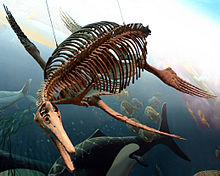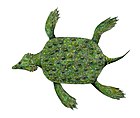Dolichorhynchops
Tampilan
| Dolichorhynchops | |
|---|---|
| Taksonomi | |
| Galat Lua: callParserFunction: function "Template" was not found. | |
| Genus | Dolichorhynchops Williston, 1902 |
| Tipe taksonomi | †Dolichorhynchops osborni Williston, 1902 |
| Spesies lain | |
Dolichorhynchops adalah genus plesiosauria Polycotylidae yang sudah punah dari Kapur Akhir (sub-kala Turonian awal sampai Kampanium akhir) dari Amerika Utara, mengandung tiga spesies, D. osborni, D. bonneri dan D. tropicensis,[1] juga spesies keempat yang diragukan, D. herschelensis.[2] Dolichorhynchops adalah reptil laut prasejarah. Nama generiknya merupakan bahasa Yunani yang berarti "wajah berhidung panjang".
Klasifikasi
[sunting | sunting sumber]
Di bawah ini adalah kladogram kekerabatan Polycotylidae dari Ketchum & Benson, 2011.[2]
| Plesiosauroidea |
| |||||||||||||||||||||||||||||||||||||||||||||||||||||||||||||||||||||
Lihat juga
[sunting | sunting sumber]Catatan
[sunting | sunting sumber]- ^ Schmeisser McKean 2011
- ^ a b Hilary F. Ketchum; Roger B. J. Benson (2011). "A new pliosaurid (Sauropterygia, Plesiosauria) from the Oxford Clay Formation (Middle Jurassic, Callovian) of England: evidence for a gracile, longirostrine grade of Early-Middle Jurassic pliosaurids". Special Papers in Palaeontology. 86: 109–129.
Referensi
[sunting | sunting sumber]- Adams, D. A. (1977), Trinacromerum bonneri, a new polycotylid plesiosaur from the Pierre Shale of South Dakota and Wyoming, Unpublished Masters thesis, University of Kansas, 97 pages
- Adams, D. A. (1997). "Trinacromerum bonneri, new species, last and fastest pliosaur of the Western Interior Seaway". Texas Journal of Science. 49 (3): 179–198.
- Albright III, L. B.; Gillette, D. D.; Titus, A. L. (2007b). "Plesiosaurs from the Upper Cretaceous (Cenomanian-Turonian) Tropic Shale of southern Utah, part 2: polycotylidae" (PDF). Journal of Vertebrate Paleontology. 27 (1): 41–58. doi:10.1671/0272-4634(2007)27[41:PFTUCC]2.0.CO;2. Diarsipkan dari versi asli (PDF) tanggal 2011-09-28.
- Bonner, O. W. (1964), An osteological study of Nyctosaurus and Trinacromerum with a description of a new species of Nyctosaurus, Unpub. Masters Thesis, Fort Hays State University, 63 pages
- Carpenter, K. (1996). "A Review of short-necked plesiosaurs from the Cretaceous of the western interior, North America". Neues Jahrbuch für Geologie und Paläontologie, Abhandlungen. 201 (2): 259–287. doi:10.1127/njgpa/201/1996/259.
- Everhart, M. J. (2003). "First records of plesiosaur remains in the lower Smoky Hill Chalk Member (Upper Coniacian) of the Niobrara Formation in western Kansas". Transactions of the Kansas Academy of Science. 106 (3–4): 139–148. doi:10.1660/0022-8443(2003)106[0139:FROPRI]2.0.CO;2.
- Everhart, M. J. (2004a). "Plesiosaurs as the food of mosasaurs; new data on the stomach contents of a Tylosaurus proriger (Squamata; Mosasauridae) from the Niobrara Formation of western Kansas". The Mosasaur. 7: 41–46.
- Everhart, M. J. (2004b). "New data regarding the skull of Dolichorhynchops osborni (Plesiosauroidea: Polycotylidae) from rediscovered photos of the Harvard Museum of Comparative Zoology specimen". Paludicola. 4 (3): 74–80.
- Everhart, M. J. (2005). Oceans of Kansas - A Natural History of the Western Interior Sea. Indiana University Press.
- Everhart, M.J.; Decker, R.; Decker, P. (2006). "Earliest remains of Dolichorhynchops osborni (Plesiosauria: Polycotylidae) from the basal Fort Hays Limestone, Jewell County, Kansas". Transactions of the Kansas Academy of Science. 109 (3–4): 261. doi:10.1660/0022-8443(2006)109[247:AOTTAM]2.0.CO;2. (abstract)
- Everhart, M. J. (2007). Sea Monsters: Prehistoric Creatures of the Deep. National Geographic. ISBN 978-1-4262-0085-4.
- O'Keefe, F. R. (2004). "On the cranial anatomy of the polycotylid plesiosaurs, including new material of Polycotylus latipinnis Cope, from Alabama". Journal of Vertebrate Paleontology. 24 (2): 326–340. doi:10.1671/1944.
- Sato, T. (2005). "A new Polycotylid Plesiosaur (Reptilia: Sauropterygia) from the Upper Cretaceous Bearpaw Formation in Saskatchewan, Canada". Journal of Paleontology. 79 (5): 969–980. doi:10.1666/0022-3360(2005)079[0969:ANPPRS]2.0.CO;2.
- Schmeisser McKean, Rebecca (2011). "A new species of polycotylid plesiosaur (Reptilia: Sauropterygia) from the Lower Turonian of Utah: extending the stratigraphic range of Dolichorhynchops". Cretaceous Research. 34: 184–199. doi:10.1016/j.cretres.2011.10.017.
- Sternberg, C. H. (1922). "Explorations of the Permian of Texas and the chalk of Kansas, 1918". Transactions of the Kansas Academy of Science. 30 (1): 119–120. doi:10.2307/3624047. JSTOR 3624047.
- Sternberg, G. F.; Walker, M. V. (1957). "Report on a plesiosaur skeleton from western Kansas". Transactions of the Kansas Academy of Science. 60 (1): 86–87. doi:10.2307/3627008. JSTOR 3627008.
- Williston, S. W. (1902). "Restoration of Dolichorhynchops osborni, a new Cretaceous plesiosaur". Kansas University Science Bulletin. 1 (9): 241–244.
- Williston, S. W. (1903). "North American plesiosaurs". Field Columbian Museum, Pub. 73. Geological Series. 2 (1): 1–79.








